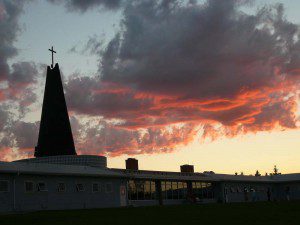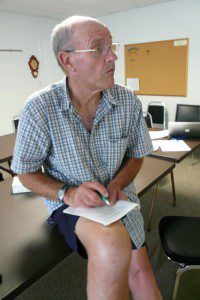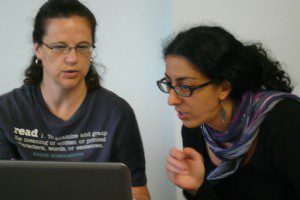
Whenever I talk with writers, there are plenty of taboos. They don’t often speak about how much money they make. Not many writers will divulge the nature of any publishing contracts they’re negotiating. And some are even superstitious about not revealing either the title or the content of a new book they’re working on. But you can always tell a group of writers is really getting into a heavy discussion when one warns:
“No, no. Don’t use the ‘M’ word!”
‘M’ stands for metaphor. And, of course, a metaphor – a figure of speech in which there’s an implied comparison between two different things – is a handy tool in nearly every kind of writing. Political satirists might compare politicians to a horse’s ass. Novelists may use the layers of an onion to illustrate the way of revealing character. Or poets – they’re most guilty – use metaphors all the time, comparing birth to light, death to darkness and life the abyss in between.
This week, as I did last year, I led a mid-summer, non-fiction writers’ workshop at a monastery in the Qu’Appelle Valley north of Regina, Sask. The Sage Hill Writing Experience allowed me to work with four writers attempting to get their planned manuscripts closer to book status.
The appropriate metaphor here might be getting their creations “closer to being born.”

Except that one of my four writers, named Jerry Haigh, is not a woman; he has, however, metaphorically given birth to three previous books. Drawing from his worldwide experiences as a wildlife veterinarian (based at the University of Saskatchewan), he has been “Wrestling With Rhinos,” learned “The Trouble with Lions,” and discovered the essence “Of Moose and Men.” Clearly a man with little or no fear of large creatures, Dr. Haigh faces perhaps his greatest wildlife challenge (and most daunting metaphor) in his next book (the one we worked on this week) about the physical, environmental, political and mythological state of the world’s polar bear population.
“Polar bears,” Dr. Haigh pointed out, “are the current ‘poster child’ for issues ranging from conservation to climate change and the perilous state of the Arctic.”

Another of my writing colleagues this week, Jean Crozier, has succeeded in everything she’s touched in her professional life. She ran a successful library and information management company in Alberta for 20 years. She has self-published a two-volume family memoir, called “No Corner Boys Here.” An Alberta magazine even chose her among the “Fifty Most Influential People” in the province. But her greatest victory, navigating her way “Through Widowhood,” she feels, can only be accomplished by publishing the story of her husband’s premature death and her own ability to cope.
“No one else can feel the death knife…” she wrote.

In contrast, a schoolteacher from Prince Albert, Sask., has perhaps the greatest and worst story to tell. The trauma faced by one member of Evonne Garnett’s family leaves no room for metaphor. The abuse that members of her family inflicted on one other, goes back to its roots in Russia, migrates to the Canadian Prairies in the guise of duty, and slips through the cracks of every social safety net imaginable. Diary tales of rape, paedophilia and being a prisoner in the attic, would have a reader expect only death and a funeral in the last chapter.
“[But] with only the aid of her journals and her faith,” Garnett writes, “she broke free of the abuse cycle to find a measure of peace and freedom.”
Freedom never seemed a problem for Ayelet Tsabari, the fourth writer in my group. Born and raised in Israel by her Yemeni parents, Tsabari left her comfortable home there to travel and search. Her current memoir, what she calls “a suite of essays,” explores her own travels as a woman apparently unable to settle in one place. She too has found a comfortable home in metaphor, for, in one instance, she uses her short time “joining” the Israeli Defence Force to make her point.
“Saying I ‘joined’ the IDF makes it sound as if I did it on a whim, like taking up tap-dance lessons,” she writes.
Service was mandatory, boring and unpleasant; at one point she was accused of stealing weapons. Exonerated in a zany scene involving a lie detector, she soon moved on, eventually to Canada, to marriage and a string of awards for her writing.
I hold great hope for my four creative colleagues. Unlike the writers I described at the beginning – afraid to deal with taboos – these successful authors-in-the-making have been fearless and honest with themselves and each other. Last night, as a number of us gathered to gaze at a Prairie night sky bursting with stars, one last impression – yes, a metaphor from Robert Browning – came to mind.
“One’s reach should exceed one’s grasp, else what’s a heaven for?”
Ted, a great post! So sorry I missed you last night. I hadn’t realized you were leaving early… Safe travels and congrats!
Congratulations, Ted, on your VAC award. Well deserved.
Your current article: What a touching compliment to your class. The photo introduces a peaceful setting and tone and your comments of each participant’s work really make one anxious to read the books-in-progress. I look forward to reading more posts and maybe avoiding a tornado to attend another workshop. Again, thanks.